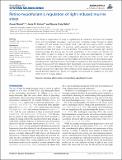Retino-hypothalamic regulation of light-induced murine sleep
Author(s)
Muindi, Fanuel; Zeitzer, Jamie M.; Heller, Horace Craig
DownloadMuindi-2014-Retino-hypothalamic.pdf (554.3Kb)
PUBLISHER_CC
Publisher with Creative Commons License
Creative Commons Attribution
Terms of use
Metadata
Show full item recordAbstract
The temporal organization of sleep is regulated by an interaction between the circadian clock and homeostatic processes. Light indirectly modulates sleep through its ability to phase shift and entrain the circadian clock. Light can also exert a direct, circadian-independent effect on sleep. For example, acute exposure to light promotes sleep in nocturnal animals and wake in diurnal animals. The mechanisms whereby light directly influences sleep and arousal are not well understood. In this review, we discuss the direct effect of light on sleep at the level of the retina and hypothalamus in rodents. We review murine data from recent publications showing the roles of rod-, cone- and melanopsin-based photoreception on the initiation and maintenance of light-induced sleep. We also present hypotheses about hypothalamic mechanisms that have been advanced to explain the acute control of sleep by light. Specifically, we review recent studies assessing the roles of the ventrolateral preoptic area (VLPO) and the suprachiasmatic nucleus (SCN). We also discuss how light might differentially promote sleep and arousal in nocturnal and diurnal animals respectively. Lastly, we suggest new avenues for research on this topic which is still in its early stages.
Date issued
2014-08Department
Massachusetts Institute of Technology. Department of Brain and Cognitive SciencesJournal
Frontiers in Systems Neuroscience
Publisher
Frontiers Research Foundation
Citation
Muindi, Fanuel, Jamie M. Zeitzer, and Horace Craig Heller. “Retino-Hypothalamic Regulation of Light-Induced Murine Sleep.” Front. Syst. Neurosci. 8 (August 4, 2014). p.1-9.
Version: Final published version
ISSN
1662-5137